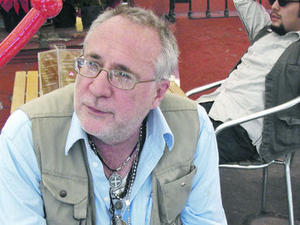There is a broad movement for an end to the violence that has been gripping many parts of Mexico. But there is a major disconnect between, on the one hand, the movements that have arisen from (and remain in) civil society and, on the other hand, movements that seek state power through the organization of political parties. The civic movements for peace and “no more blood” include groups organized to confront the militarization of the drug war, campesinos and their supporters struggling for an end to the state-sponsored/permitted violence against the “ecological campesino” movement, groups organized for the protection of human rights in general, and many other self-organized movements. The parties that ought to be the natural allies of these civic movements are in the electoral coalition dominated by the faction-ridden Party of the Democratic Revolution (PRD). Thus far they have kept their distance.
 Currently the most prominent anti-militarization movement is the Movement for Peace with Justice and Dignity (MPJD), led by the poet, Javier Sicilia, who lost a son to the violence. The movement has strong links within civil society, including a friendly, though low-key, relationship with the Zapatista Liberation Army (EZLN), but no particular links to the parties of the electoral left. Nor does it claim to seek any power for itself. In this sense it is in tune with the open informality of the U.S. Occupy movement and the self-organized anti-systemic movements of Spain, Chile, Greece, and elsewhere, as well as a growing global network of solidarity.
Currently the most prominent anti-militarization movement is the Movement for Peace with Justice and Dignity (MPJD), led by the poet, Javier Sicilia, who lost a son to the violence. The movement has strong links within civil society, including a friendly, though low-key, relationship with the Zapatista Liberation Army (EZLN), but no particular links to the parties of the electoral left. Nor does it claim to seek any power for itself. In this sense it is in tune with the open informality of the U.S. Occupy movement and the self-organized anti-systemic movements of Spain, Chile, Greece, and elsewhere, as well as a growing global network of solidarity.
Sicilia, himself, has been particularly critical of the protagonists of Mexico’s just-underway presidential campaign. None of the presidential candidates are likely to bring stability to Mexico, he told the daily paper El Universal last week. What the country needed, he said, was a “moral candidate of unity” who can rally the country around a national citizen’s agenda. Without such across-the-spectrum unity, he said, no president would be able to repair the tremendous fractures in the country and its political system.
And the feeling is mutual. Up to now, none of the major candidates for the presidency has sought any kind of alliance with the MPJD, and few have had anything to say about the strategies against drug trafficking and organized crime.
This disconnect is neither new nor unexpected, but it has not always existed in Mexico. Indeed, a strong “social left” that emerged from the civic movements following Mexico City’s 1985 earthquake played a major role in the construction of the PRD in the late 1980s. That social left still exists, but while a part of it retains its autonomy, another part has been built around the presidential campaign of the PRD’s Andrés Manuel López Obrador. It is that division that best exemplifies the civic-electoral disconnect.
For more from Fred Rosen's blog, "Mexico, Bewildered and Contested," visit nacla.org/blog/mexico-bewildered-contested. See also the May/June 2011 NACLA Report "Mexico's Drug Crisis," or NACLA blogs, Border Wars and Traffick Jam, for more on the U.S.-Mexico border or drug trafficking in the region.

